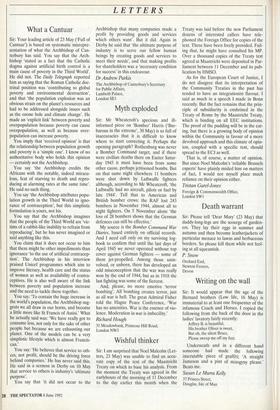LETTERS What a Cantuar
Sir: Your leading article of 23 May (Tull of Cantuar') is based on systematic misrepre- sentation of what the Archbishop of Can- terbury has said. You say that the Arch- bishop 'stated as a fact that the Catholic dogma against artificial birth control is a main cause of poverty in the Third World'. He did not. The Daily Telegraph reported him as saying that the Roman Catholic doc- trinal position was 'contributing to global poverty and environmental destruction', and that 'the population explosion was an obvious strain on the planet's resources and had to be addressed alongside issues such as the ozone hole and climate change'. He made an 'explicit link' between poverty and overpopulation because poverty can cause overpopulation, as well as because over- population can increase poverty.
You imply that 'received opinion' is that the relationship between population growth and poverty is a 'simple one'. I know of no authoritative body who holds this opinion — certainly not the Archbishop.
You say 'the Archbishop credits the Africans with the notable, indeed miracu- lous, feat of starving to death and repro- ducing at alarming rates at the same time'. He said no such thing.
You say 'the Archbishop attributes popu- lation growth in the Third World to igno- rance of contraception', but this simplistic formulation is yours, not his.
You say that the Archbishop imagines that the people of the Third World are 'vic- tims of a rabbit-like inability to refrain from reproducing', but he has never imagined or said anything like this.
You claim that it does not occur to him that there might be other impediments than ignorance 'to the use of artificial contracep- tion'. The Archbishop in his interview praised Unicef programmes which aim to improve literacy, health care and the status of women as well as availability of contra- ceptives. He is also well aware of the link between poverty and population increase and the need to tackle these together.
You say: 'To contain the huge increase in the world's population, the Archbishop sug- gests we all draw in our horns, and become a little more like St Francis of Assisi.' What he actually said was: 'We have really got to consume less, not only for the sake of other people but because we are exhausting our planet. One of the models can be a very simplistic lifestyle which is almost Francis- can.'
You say: 'He believes that service to oth- ers, not profit, should be the driving force behind companies.' He has never said this. He said in a sermon in Derby on 10 May that service to others is industry's 'ultimate purpose'. You say that 'it did not occur to the Archbishop that many companies made a profit by providing goods and services which others want'. But it did. Again in Derby he said that 'the ultimate purpose of industry is to serve our fellow human beings by creating goods and services to meet their needs', and that making profits for shareholders was a 'necessary condition for success' in this endeavour.
Dr Andrew Purkis
The Archbishop of Canterbury's Secretary for Public Affairs, Lambeth Palace, London SE1


































































 Previous page
Previous page